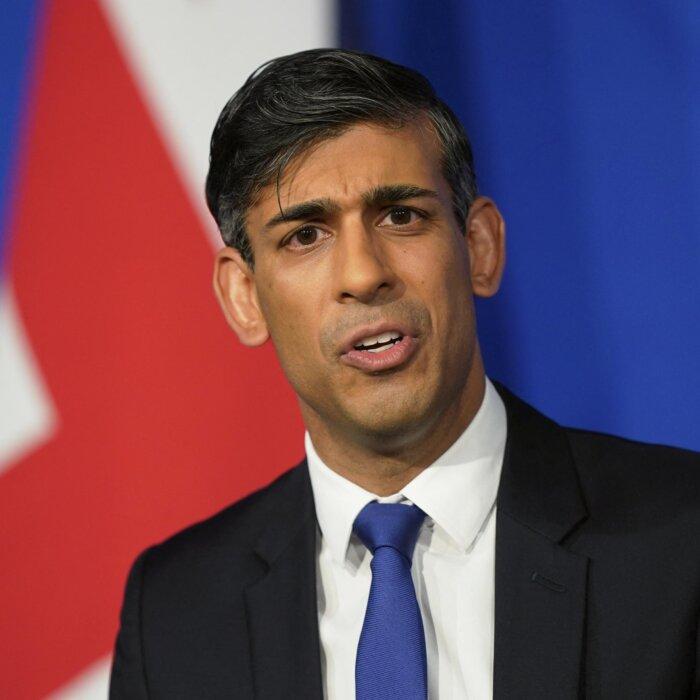More than 40 right-leaning backbench MPs are challenging the government over its proposed Rwanda bill, as a pollster warns that the Rwanda plan in its current form “will not deter illegal migrants.”
During the Committee Stage of the Safety of Rwanda (Asylum and Immigration) Bill on Wednesday, backbench Tory MPs, including prominent figures like Sir Bill Cash, former Immigration Minister Robert Jenrick, former Home Secretary Suella Braverman, and Jacob Rees-Mogg, tabled amendments they believe will grant the UK more autonomy in shaping its immigration policy.
Since then, their number has grown from just over 30 to more than 40, including former Prime Minister Liz Truss.
Westminster sources say that this figure is still growing as debates continue until Friday, with the government angling for the bill to pass its third and final stage in the Commons next week.
Matt Goodwin, director of PeoplePolling, told The Epoch Times: “Stopping the boats is the number one priority for 2019 Conservative Party voters.
“So it is essential that whatever plan the party introduces for creating a third-party deterrent (namely the Rwanda plan) actually works, because unless it does work, the party has absolutely no chance of holding on to those voters at the election.
Rwanda Plan ‘Will Not Deter Illegal Migrants’
“This is why so many Conservative MPs are planning to rebel because many of them sense, understandably, that the plan in its current form will not deter illegal migrants from crossing the Channel.”The proposed amendments, including those by Mr. Jenrick, aim to override legal provisions related to the Human Rights Act 1998, EU-derived law, and international law. They seek to expedite removals to Rwanda and limit an individual’s ability to block their own removal.
One of Mr. Jenrick’s amendments aims to strengthen existing powers, allowing ministers to ignore last-minute injunctions from the European Court of Human Rights, making it the default position rather than a discretionary government decision.
Mr. Jenrick refrained from confirming whether he would support the legislation if not revised. On Wednesday, he told BBC Radio 4’s “Today” programme, “This is the third piece of legislation in three years, it’s three strikes or you’re out, we’ve got to get this right.”
The proposed measures endorsed by Mr. Jenrick and his allies seek to halt what he referred to as the “merry-go-round of individual claims,” where illegal migrants exploit every possible defence to obstruct their removal to Rwanda.
Additionally, these amendments aim to prevent flights from being grounded by emergency injunctions from the European Court of Human Rights.
‘Stakes High’ for the Country
Despite these efforts, Mr. Jenrick said, “[The] Government’s reported legal advice is that the bill has a 50 percent chance at best of getting a single flight off to Rwanda before the general election. When the stakes are so high for the country, I don’t think that’s acceptable. We need to make sure it’s much more rigorous than that.”Former Home Secretary Suella Braverman, a supporter of the proposed changes by Mr. Jenrick and Sir Bill Cash, emphasised the significance of adopting these amendments, asserting that failing to do so and introducing another flawed bill would be a betrayal of the British people.
In her article for the Daily Mail on Wednesday, she argued, “As drafted, this bill will not stop the boats.”
Voicing his concerns about the government’s own legal advice, Jonathan Gullis, a former minister, and a key figure in the right-leaning New Conservatives group of MPs, told Sky News: “The Government’s own lawyers have also reportedly advised that the scheme, as currently laid out, is fundamentally flawed. They rightly conclude that it will be bogged down with individual legal challenges from migrants.”
He further warned that if the bill is weakened during the legislative process, he would vote against it.
Rebels, backed by the Democratic Unionist Party, have expressed scepticism about the government’s commitment to using these powers, highlighting potential opposition from Attorney General Victoria Prentis. However, ministers emphasise their readiness to use the powers if circumstances necessitate.
Centrist Tories Push Back
The One Nation group, representing a more liberal stance, constitutes the largest individual faction within the Conservative parliamentary party, with over 100 MPs as members. In opposition to Mr. Jenrick’s faction, this group asserts the importance of upholding the UK’s human rights obligations under international law.Damian Green, former first secretary of state and the group’s chair, said he has received assurances that the bill will not be reinforced.
He told the New Statesman, “The prime minister has looked me in the eye and assured me that he does not intend to pursue any further strengthening.”







